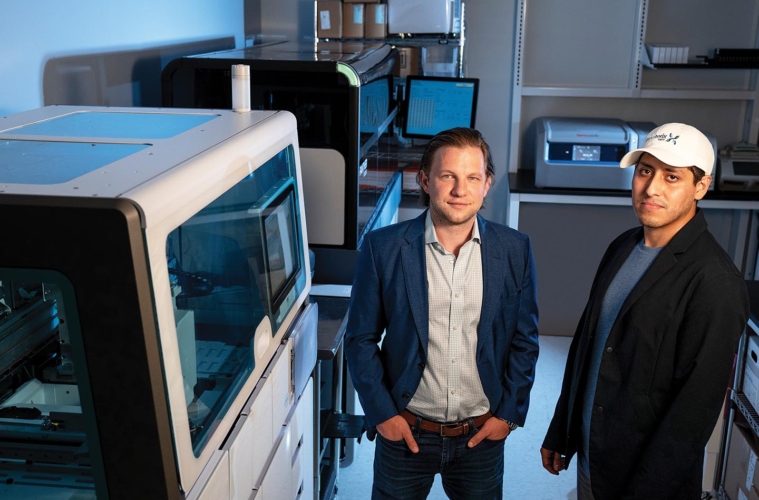Sam Davalos ’14 and Nick Mitilenes ’10 have started their own molecular testing laboratory.
At the beginning of the COVID-19 pandemic, testing for the coronavirus was slow, inaccurate, and expensive. By the end, however, the advent of home tests, rapid PCR testing, and extreme competition changed patients’ ideas about how easy testing could be. “COVID spoiled folks in a way. Expectations have changed dramatically,” says Nick Mitilenes ’10. “Now everyone believes [disease testing] will be low cost and error free with results in real time.”
Those expectations have created an opportunity for a new approach to testing, not just for common viruses such as SARS- CoV-2, the virus that causes COVID-19, but also for a range of nonroutine, or esoteric, infectious diseases. Mitilenes and Sam Davalos ’14 are launching Innoterix Labs this summer with the aim of transforming lab testing by making it dramatically more efficient.
Davalos and Mitilenes are both veterans of COVID-19 testing labs during the pandemic, when they gained experience in managing high-volume PCR laboratories — but also saw significant room for improvement. “Seeing the firsthand impact a costly decision can have on not just patients, but also colleagues left us hungry to challenge ourselves: Can we do things better?” says Davalos. While lab technicians may not be as visible as doctors in the medical industry, some 14 billion lab tests are ordered each year, with 70% of medical decisions made based on lab results, according to the Centers for Disease Control and Prevention. “That’s always been very powerful to me,” says Mitilenes. “Even though we don’t have the opportunity to see patients firsthand, we know we are providing a valuable service to many more patients than a provider can reasonably see in a day.”
Both Mitilenes and Davalos were molecular biology majors at Colgate, focusing on the processes of life involving protein and DNA. The two entered Colgate intending to be pre-med. However, growing up in New Jersey, Mitilenes’ parents and grandparents were laboratory clinicians, so he was already aware of clinical diagnostics as an alternative path. After graduating, he joined New Jersey– based MedLabs Diagnostics, rising to become president and COO by 2019. Davalos, who is originally from Ecuador, became disillusioned from practicing medicine after interning at a hospital, but loved the molecular techniques he was learning from biology professors like Damhnait McHugh, the Raab Family chair. “She instilled a lot of advanced molecular biology techniques during our senior seminar,” he says.”
While the two founders didn’t overlap at Colgate, they met at a networking event through their fraternity, Phi Delta Theta, and Mitilenes recruited Davalos to MedLabs. When the pandemic hit in 2020, Mitilenes became president of a subsidiary of the laboratory testing company Eurofins Scientific, while Davalos learned informatics systems and automation at Siemens Healthineers before joining Mitilenes once again at Eurofins. Eventually, they both joined Pandemic Response Lab at Opentrons Labworks — the lab that claims to have discovered the Omicron variant of SARS-CoV-2.
Their new laboratory testing company will employ the real-time polymerase chain reaction (RT-PCR or qPCR) technique that became a household term during the pandemic, as well as other methods, including next-generation sequencing that employs molecular techniques to test for viruses, bacteria, yeasts, and parasites. They’ll use them to tackle various types of infectious agents such as HIV, hepatitis C, and vector- borne illnesses such as Lyme disease. “There are hundreds of pathogens for which we can use molecular techniques to detect, quantify, and characterize with superior performance to existing methods,” Mitilenes says. The goal of their company is to design individual testing regimens for these pathogens, automating and miniaturizing (i.e., conducting the molecular reactions at a smaller scale than what is typical, without sacrificing performance) many of the processes and developing new reagents to make testing more efficient and drive down costs. In addition, the company has invested up front in an enterprise-grade laboratory information system as well as various robotic systems.
So far, the New Jersey–based Innoterix Labs has been completely funded by its two founders, and they believe they can continue to grow with minimal outside investment. In addition to Davalos and Mitilenes, the company has five other team members and is looking to add one or two more this summer. “We’re excited about the upcoming launch, both as a way to celebrate what we’ve accomplished and to start offering both clinical and research services across the country with market-leading pricing and service,” Mitilenes says.
While the goal of the company is to earn a profit, the founders are also driven by a mission to make testing more widely affordable to those who need it. “We want to expand access to clinical providers, researchers, and public health institutions, while also improving clinical and scientific utility,” Mitilenes says.
Davalos adds: “It’s about working with our customers and providers, understanding their challenges, and innovating solutions through collaboration and communication.”
Mitilenes met his wife, Tiffany Avila ’10 Mitilenes, at Colgate.

